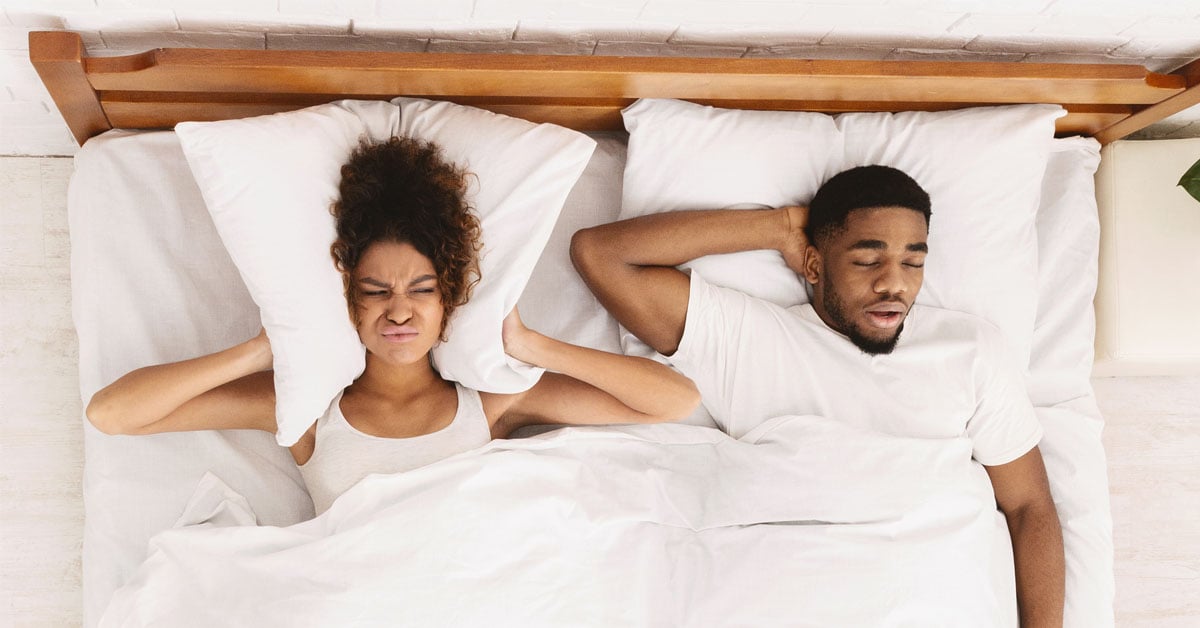
If your spouse or partner has ever let you know that your snoring rattles the windows, or if they’ve witnessed you stop breathing for several seconds, then gasping for breath in the middle of the night, you may have sleep apnea.
Sleep apnea is a chronic sleep disorder that causes shallow or interrupted breathing during sleep. Whether these interruptions last for a few seconds or even a minute or more, they repeatedly deprive your body of the oxygen it needs. Surprisingly, most sufferers never realize it’s happening. But, there are noticeable symptoms, if you know what to look for.
Symptoms of sleep apnea
Sleep apnea causes abnormal fatigue during the active hours of the day. This is due to the havoc it causes with your normal sleep patterns and the restfulness of your sleep. Experts have likened serious chronic sleep apnea to “half-sleep,” meaning a sufferer who is in bed, seemingly asleep, for eight hours, will feel like they’ve slept about four.
Other common daytime symptoms of sleep apnea include headache, sore throat, and dry mouth, especially immediately upon waking. The real danger, however, is the long-term impact of chronic sleep apnea on the individual’s overall health.
If left untreated, sleep apnea can increase your risk of heart attack, stroke, high blood pressure, obesity, and diabetes. Plus, the chronic sleepiness it causes can contribute to clumsiness and even serious roadway accidents.
How sleep apnea affects your oral health
This condition also has a negative impact on your oral health. In fact, a recent policy adoption by the American Dental Association (ADA) in October of 2017 established that, “dentists are the only health care provider with the knowledge and expertise to provide oral appliance therapy (OAT)” for treatment of sleep apnea and some other sleep-related breathing disorders (SRBDs).
Dry mouth
"Sleep apnea causes abnormal fatigue during the active hours of the day. This is due to the havoc it causes with your normal sleep patterns and the restfulness of your sleep."
People who suffer from sleep apnea tend to breathe with their mouths open. As a result, they frequently experience dry mouth (also known as xerostomia.)
Saliva, your body’s natural mouth moistener, plays a number of offensive and defensive roles as a protector of your teeth and gums. It helps digest food, protects your teeth from decay, fights infection and balances the population of natural bacteria in your mouth.
When you’re suffering from xerostomia, all these areas suffer. Left untreated, it can lead to chronic bad breath, tooth decay, gum disease, and infections. While treating the underlying cause of the issue — sleep apnea — is important, you should also treat the symptom itself by restoring the moisture in your mouth:
- Sip on water before you go to bed and immediately upon waking
- Keep a humidifier in your room while you sleep
- Chew sugarless gum occasionally during the day
Teeth grinding
As many as one in four patients with obstructive sleep apnea routinely grind their teeth at night as well.
This may be because lack of sleep contributes to mood swings and anxiety, therefore artificially raising stress levels. High stress levels, in turn, cause people to grind their teeth. The exact correlation has not yet been proven. However, there is no question that both sleep apnea and bruxism (the diagnostic term for teeth grinding) are detrimental to your health.
The only way to confirm a diagnosis of bruxism is to allow a dentist to inspect your back teeth, which may be abnormally flattened and prone to chipping and cracking due to the practice. With a proper diagnosis in hand, you can be prescribed a mouthguard or other protective device to reduce the damage caused in the short term while you work to reduce stress over the long term.
If there’s a chance you’re suffering from sleep apnea, xerostomia, or bruxism, contact your dentist right away for an examination. Early diagnosis and effective treatment can readily resolve these issues and prevent serious future results.
If cost is getting in the way of seeking out dental care, see your options for finding affordable dentists and learn how a dental discount card can help you save on dental care as much as 50%.

